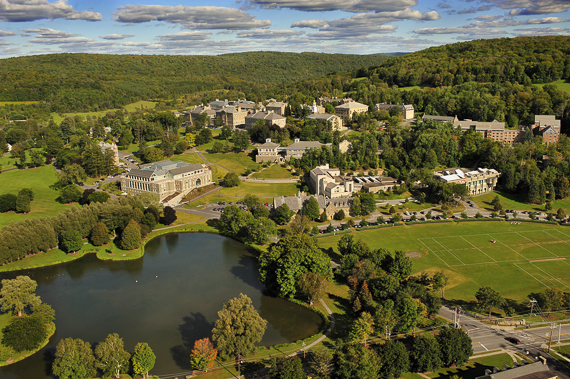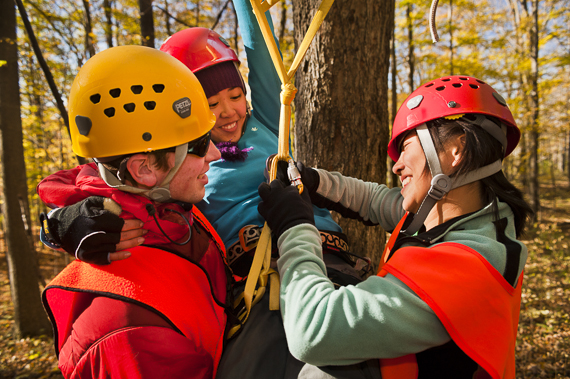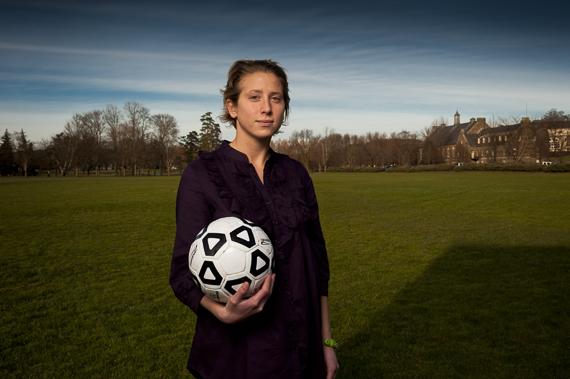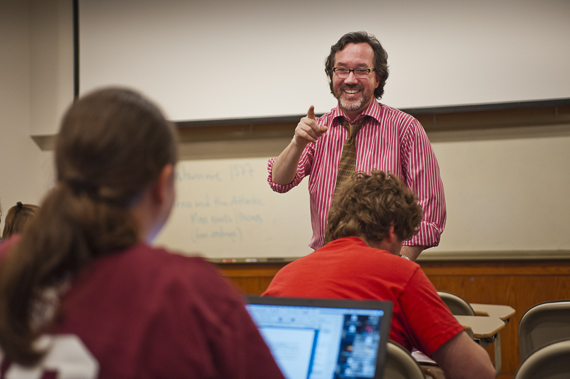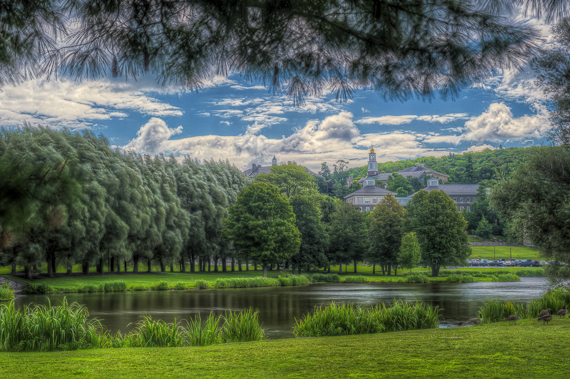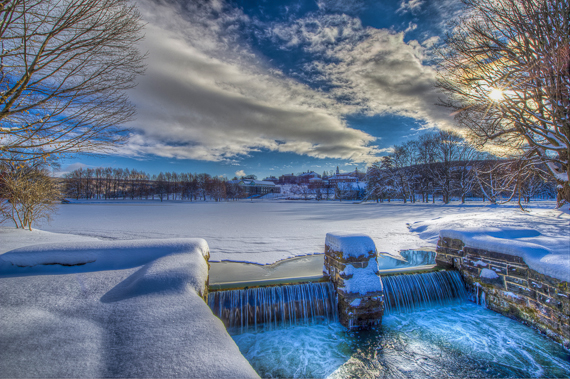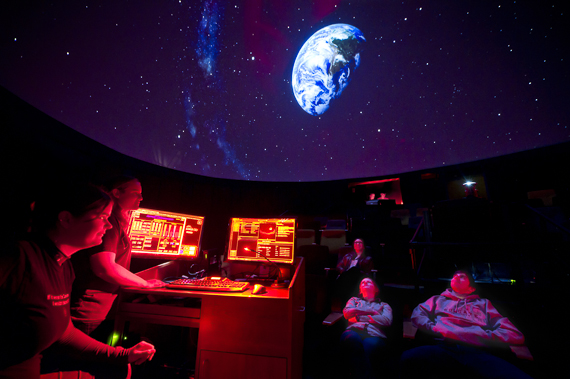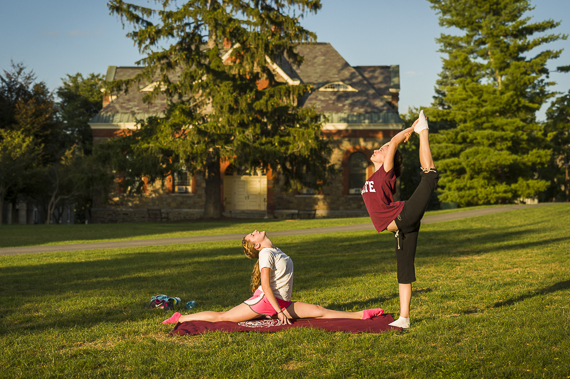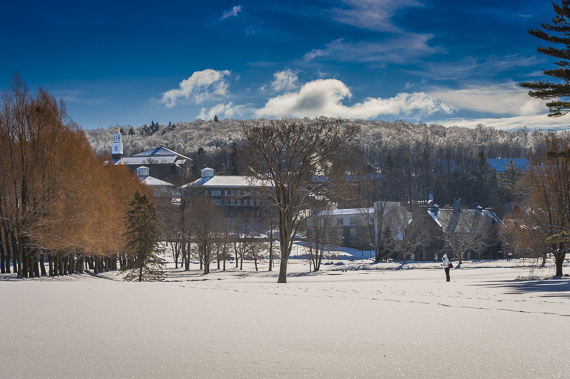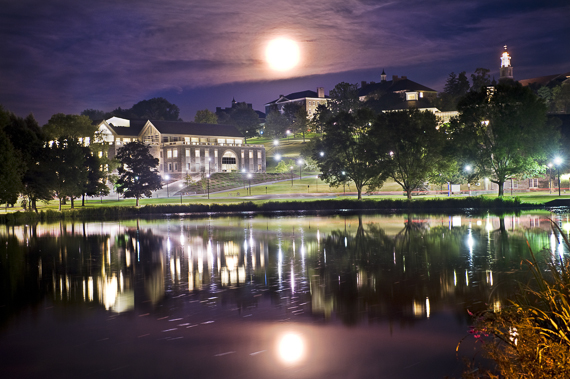This month’s Year of ’13 list, presented on a very special , is by Andy Daddio, 51łÔąĎÍř photographic services coordinator. He selected his 13 favorite campus photos that he has taken so far from an archive of more than 220,000 photographs.
This is my first aerial shoot for 51łÔąĎÍř, and the fourth helicopter shoot of my career. This was also taken shortly after my arrival at 51łÔąĎÍř in 2008. Our department wanted a new set of aerial shots, and I was asked to enlist an outfit to shoot them. Instead, I offered to find a helicopter pilot and shoot them myself. It was a beautiful, clear day with perfect weather for aerial shots (some clouds for visual elements in the sky, but not too many or too much cloud cover). Despite being afraid of heights, I find shooting aerials to be a fun and very exhilarating experience.
This image was taken during the first 24/7 project that I shot and coordinated. The project documented student life at 51łÔąĎÍř around the clock for a week-long period. This image was captured at a show during family weekend. I had just begun working with a new Nikon D3 camera when I arrived at 51łÔąĎÍř, and I was blown away by the incredible low light capabilities of the camera. I shot this image at ISO 6400, a sensitivity that was unimaginable just a few years prior (with film or digital).
Wandering around to find enterprise shots is one of my favorite photo assignments at 51łÔąĎÍř, and I never know what I will find. I was out looking for good autumn scenic photos around the , and happened upon a group of students who were participating in an Tree Climbing course during the autumn break. The cooperation and caring that the students have for one another is almost palpable in this photo, which to me seems to really embody the 51łÔąĎÍř spirit and character.
was diagnosed with cancer during her junior year at 51łÔąĎÍř, and after leaving for a semester for chemotherapy, returned to 51łÔąĎÍř and to the soccer field. After beating cancer, Kiki went on to win the Patriot League’s Scholar-Athlete of the Year. I wanted to do something special for the portrait of her because I was very inspired by her story, and also since I’ve lost several friends and family members to cancer. I had my assistant, , hold a black Lightform Panel that acted as a scrim to block all of the natural ambient sunlight from hitting Kiki. I then lit her with a White Lightning strobe fired through a 43″ Wescott shoot-through umbrella to provide a very soft, pleasing light. The file was then run through OnOne Perfect Effects to enhance the colors, saturation, and contrast.
I just love this shot of , associate professor of history and Africana & Latin American Studies, teaching a class. It typifies the type of learning environment that I see at 51łÔąĎÍř; faculty members who really love the students and really love teaching. Classroom photography can be very difficult, and Antonio has such a great energy and great rapport with the students, and the students respond to this infectious energy. Plus one of the really great things about being a photographer at a university is that I actually get to learn a lot of things about many different subjects while I am on a photo shoot, which is a fantastic perk.
I will sometimes find out about neat things on campus from relationships with students that developed as the result of other photo shoots. I photographed students doing a fencing demonstration at the chapel, and one of the students emailed me afterward letting me know that they were doing a performance of The Nutcracker. I will often photograph the full dress rehearsal rather than the performances for theater. I photographed preparations and backstage action, and then shot the performance. The dancer caught in mid-air was just spot-on. Every move, every step and leap was executed perfectly. This shot of the dancer caught in mid-air has become one of my favorite that I’ve ever taken of a performance.
I shot this image just a couple of weeks after my sister died after a horrendous bout with cancer. I was feeling very depressed and just needed to get out and shoot. Shooting for me is a very meditative process, and helps me to get out of my own head and to be fully in the moment. As far as the technical side of things: It was a multi-step process. I used a 3-stop neutral density filter, as well as a polarizing filter on the camera lens when I shot it. That did two things; it reduced the light that was hitting the camera’s sensor by about 97 percent, so that roughly three percent of the light that would normally be available was reaching it. This greatly increased the necessary exposure time, which allowed me to capture the movements of tree branches so that they have a liquid kind of feel (the long exposure time also necessitated the use of a tripod to keep the camera steady). The polarizing filter also reduces reflections and enhances colors, such as deepening the blueness and saturation of the sky. I then did nine bracketed exposures of the scene using different exposure times and used them as the basis for a High Dynamic Range (HDR) image. HDR provides an extraordinarily expanded tonal range — you can see the brightest highlights as well as into the deepest shadows. I compiled the multiple exposures using special software to produce a single image. That file was then imported back into Adobe Lightroom, where I applied a lens blur effect to the outer image areas and made some other tonal and color adjustments.
Another of my favorite HDR scenic shots of the campus. I really like the spillway, and find it visually interesting. I had to make sure that the water in each exposure was moving and not stopped or frozen by the shutter speed of the camera so that it appeared the same in each shot when assembled. This shot was the result of nine separate exposures, each one Ć’ stop apart (each change in Ć’ stop is doubling or halving the amount of light hitting the sensor), assembled with Photomatix Pro, then reimported to Adobe Lightroom for color and contrast enhancements and minor retouching.
Another HDR image, this time with a student in the atrium. I had been doing some winter scenic shots, and went to cut through the Ho Science Center to warm up a bit on my way back to the office. I saw a lone student studying next to the window, and my camera was already set up on a tripod with a cable release. I shot a couple of sequences, altering the focal length of the lens for each set, and then ran nine exposures from one of the sequences I shot through Photomatix Pro, then reimported the file to Adobe Lightroom for color and contrast enhancements and minor adjustments. HDR shots with people are trickier, because if there is any movement between frames, it will destroy the illusion. Fortunately, this student didn’t move at all during any of the exposures.
This was a really fun shoot for a revision of the 51łÔąĎÍř . I often take my two little sons to the Vis Lab for the Friday night shows, and really like the space. This was a straight shot, meaning that it was captured in one click of the shutter and not composited. My student worker, , helped assist me on this one. I set the camera up on a tripod with an ultra-wide angle 14mm lens. The exposure was 1.6 seconds, so all of the students had to remain very still during the exposures. The red light on the two students on the left was from the red gels that cover the computer screens; red light won’t interfere with the increased sensitivity that the eye develops to darkness. The two students in the back booth were lit with one Nikon SB-800 flash, with a 14mm diffusion panel and diffusion dome, set on a Justin Clamp, with a red gel to match the red on the students in the foreground. The flash was set manually and triggered with a Pocket Wizard.
I often will return to campus in the evening to go hunting for shots during the “golden hour” before sunset. This was a day or two after new student orientation, and I happened upon these two young ladies doing yoga on the Quad. I took a couple of shots, and then they became aware of me. I went over, introduced myself and explained what I was doing, and then they both continued to practice yoga while allowing me to shoot. This was a completely unscripted, candid shot, but it is one that many viewers believe was completely set up and posed.
One of my more recent winter scenic shots. This was on a particularly cold morning, after an extremely cold spell. It was so cold that Taylor Lake froze over and there were students playing ice hockey just out of frame on the right-hand side. I had stopped to photograph them, and as I left I saw this student walking onto campus. I will often try to isolate one individual in the landscape that I am shooting. The student stopped walking and stood next to Taylor Lake, taking in the beautiful scene before her. I shot a sequence of images, and in this one, if you look closely, you can see her breath as she exhaled.
This was another of my very early campus scenic shots, taken shortly after arriving at 51łÔąĎÍř for my new position. After spending 25 years in very urban environments, this gorgeous rural location, with an abundance of natural beauty, was exactly what I had been seeking. I had just photographed the marquee at the Hamilton Movie Theater for a Scene article, and decided to drive by campus to see if anything was happening. I saw the moon rising from behind the chapel, reflected in Taylor Lake, and I quickly parked, ran out, and shot a sequence of exposures with the camera mounted on a tripod. I manually assembled and masked each individual layer to create a final composite image composed of twenty separate layers in Photoshop. It is a 665 MB file.
